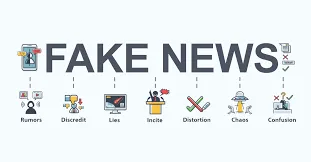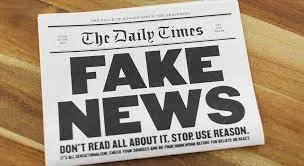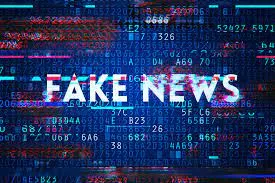Analyzing the Effects of Fake News

Fake news has become a major problem in recent years, with an increasing number of people relying on information from unreliable sources. Analyzing the effects of fake news is essential in understanding the impact it has on society. Fake news can negatively affect public opinion, decision making, and trust in the media. It has been linked with increased polarization as well as decreased trust in democratic institutions.
Additionally, it can lead to decreased engagement in politics and a lack of critical thinking. This paper will analyze the effects of fake news on society, exploring the ways in which it can lead to a dangerous level of misinformation. The paper will also discuss potential solutions to combat the spread of fake news and its consequences.
Uncovering the Truth: A Look Into Analyzing the Effects of Fake News
Fake news has been a growing issue in recent years, leading to a heightened level of confusion and debate over the truth of certain events. It is important to understand how fake news has the power to shape our opinions, and the steps we can take to uncover the truth.
Fake news is a term used to describe false or inaccurate information that is presented as if it were factual. This type of news can be spread through any form of media, including news websites, blogs, and even social media. Fake news stories often contain exaggerated or sensationalized claims, and are designed to draw attention and increase viewership.
The effects of fake news can be far-reaching. Fake news can lead to mistrust of the media, can increase political polarization, and can even cause division between different groups of people. Fake news can also be used to manipulate public opinion or influence political decisions.
In order to uncover the truth, it is important to be aware of the sources of information. It is important to question the reliability of the source and consider if the information is biased or lacking in evidence. The more sources you can consult, the more likely it is that the information being presented is accurate.

It can also be helpful to consider the context of the news. For example, if a news story focuses on a certain aspect of an issue, it’s important to look into other aspects of the story to ensure that the information being presented is not one-sided. Additionally, researching the background of the story can help to give a more complete understanding of the subject.
Finally, it is important to be skeptical of sensationalized headlines or stories that contain emotionally charged words. These types of stories may be designed to draw attention, but they may not be based on facts.
Fake news has the power to shape our opinions and create division, but by understanding the sources of information and being aware of the techniques used to manipulate public opinion, we can uncover the truth and make informed decisions.
How Fake News Impacts Society: An Analysis of Its Effects
Fake news has become an increasingly pervasive problem in recent years, with potentially serious implications for society. This type of false information is often used to manipulate public opinion and to spread disinformation. As a result, it has caused confusion and mistrust in the media, undermined the credibility of political leaders, and led to dangerous societal divisions. This essay will discuss the impact of fake news on society and examine its effects.

The proliferation of fake news has created mistrust in the media. People have become more skeptical of the news that they receive and less likely to trust it as a reliable source of information. This has led to an overall decrease in the public’s faith in the media, as well as a decrease in their willingness to believe what they are told. Additionally, this has made it easier for those with malicious intentions to spread false information and manipulate public opinion, as people are more likely to believe it.
The spread of fake news has also had a detrimental effect on political leaders. As people become more skeptical of the news they are receiving, it is more difficult for political leaders to gain the public’s trust. This makes it harder for them to effectively communicate their policies and agendas, and it undermines their credibility. Additionally, the spread of false information can lead to a decrease in voter engagement, as people become less likely to trust the political system and the politicians who are running it.
Finally, fake news has also led to dangerous societal divisions. As people become more skeptical of the news they are receiving, they are more likely to rely on their own biases and beliefs in order to make decisions. This can lead to a further polarization of society, as people are more likely to form their opinions and beliefs based on false information rather than facts. Additionally, it can lead to an increase in hate speech and bigotry, as people are more likely to spread false information that reinforces their own views.
Fake news has had a significant impact on society. It has caused mistrust in the media, undermined the credibility of political leaders, and led to dangerous societal divisions. As a result, it is important for people to be aware of the dangers of fake news and to be vigilant in verifying the information they receive. Additionally, it is important for political leaders and the media to take steps to combat the spread of false information and to ensure that the public receives accurate and reliable information.
The Dangerous Consequences of Fake News: Analyzing Its Effects
Fake news, also known as misinformation or disinformation, is a global phenomenon that has been made possible by the rapid rise of the internet and social media. It is a form of communication that presents false or misleading information as factual, often with the intent of manipulating public opinion or spreading malicious rumors. Unfortunately, the effects of fake news can be far-reaching and devastating, with serious implications for the safety and security of individuals, communities, and nations.

The most obvious consequence of fake news is the spread of misinformation. Fake news can be used to manipulate public opinion about a certain issue or to damage the reputation of an individual or group. This can lead to an atmosphere of mistrust and suspicion in society, as people become more likely to doubt the accuracy of information that is presented to them.
Moreover, fake news can have a negative impact on our democracy and decision-making. If people are misled by false information, their opinions and decisions will be based on inaccurate or incomplete information. This can lead to the wrong policies being adopted and poor decisions being made, which can have lasting and damaging consequences.
These news can also have an impact on public health. If people believe erroneous information about a certain health issue, they may make poor decisions about their own health or the health of their families. This can have serious implications, especially if the misinformation is about a serious disease or medical condition.
Finally, fake news can have a detrimental effect on our mental health. People who are exposed to false information on a regular basis may become anxious or depressed, as they become increasingly mistrustful of the information that is presented to them. This can lead to feelings of insecurity and isolation, as well as difficulty in forming meaningful relationships.
It is clear that fake news can have serious and dangerous consequences, from the spread of misinformation to the undermining of democracy and public health. Therefore, it is essential that we take steps to combat this insidious form of communication, in order to protect ourselves and our society from its devastating effects.
How Beliefs are Shaped by Fake News: Analyzing the Impact
Fake news has become a major problem in modern society, as it has the potential to shape people’s beliefs and opinions on certain topics. Fake news can be defined as fabricated information that is presented as fact, which can be spread through both traditional and new media. Fake news has the power to create a false impression of the truth and can be used to manipulate public opinion.
The impact of fake news on beliefs can be seen in many different ways. For one, fake news can create a false narrative or version of the truth. This narrative can be used to influence people’s opinions about certain issues. For example, a fake news article might present a false version of a political candidate’s record, which could be used to sway public opinion in their favor.
Fake news can also be used to spread disinformation. Disinformation is intentionally false or misleading information designed to manipulate public opinion. This type of fake news can be used to discredit individuals, organizations, or even entire countries. It is often used to incite fear and distrust, and can be particularly dangerous when used to spread hate speech.

Finally, fake news can be used to create a false sense of consensus. This is a form of manipulation where a group of people are presented with false information that is designed to create the impression that everyone believes the same thing. This type of manipulation can be used to shape public opinion and even influence the outcome of elections.
The spread of fake news has created a crisis of trust in our society, as it can be difficult to tell what is real and what is not. It is important to be aware of the potential impact of fake news on beliefs, and to be vigilant in verifying information before believing it. By taking steps to recognize and combat fake news, we can ensure that our beliefs are based on facts rather than misinformation.
A Deeper Look Into Fake News: Examining Its Effects

Fake news has become an increasing problem in today’s media landscape. With the rise of social media, it has become easier than ever to spread false information, and the consequences can be damaging. Fake news has the power to influence public opinion, and can even lead to serious political and economic consequences. It is important to understand the effects of fake news in order to combat it.
These news can have a wide range of effects on society. In terms of public opinion, false information can shape the way people view a particular issue or event. This can lead to a misinformed public, which can have long-term consequences for society. Fake news can also lead to the spread of dangerous conspiracies and rumors, which can have serious implications.
In terms of politics, fake news can be used to manipulate public opinion and sway elections. The spread of false information can lead to the election of candidates who do not reflect the wishes of the people. Furthermore, fake news can be used to discredit opponents and spread disinformation about their policies. This can lead to a damaging loss of trust in the political process.
In terms of economics, fake news can be used to manipulate markets and cause instability. False information can be used to drive prices up or down, leading to market manipulation and instability. In extreme cases, this can lead to economic crises and destabilize entire countries.
Overall, it is clear that fake news can have damaging effects on society. In order to combat these effects, it is important to understand where fake news comes from and how it is spread. By understanding the source of false information, it is possible to identify and combat it more effectively. Additionally, it is important to be aware of the potential consequences of spreading false information in order to help prevent it from spreading.
Misinformation and Its Effects: A Closer Look At Analyzing Fake News

Misinformation is a growing problem in our world today. It has the power to shape public opinion, sow discord, and even influence elections. Misinformation, or “fake news,” is information that is false or inaccurate and is spread intentionally or unintentionally. Unfortunately, it is often difficult to distinguish between true and false information, especially in the digital age.
The effects of misinformation can be wide-reaching. People can form false opinions based on false information or become more distrustful of the news media. Additionally, it can lead to the spread of dangerous conspiracy theories and can even create physical and mental health issues.
Analyzing fake news is a difficult task. Misinformation can be spread via social media platforms or through traditional media outlets. To combat the spread of false information, it is important to look for certain signs of fake news. This includes being aware of the source of the information, verifying the facts presented, and considering the motivations of the source.
Furthermore, it is important to recognize the potential impact of misinformation. It is essential to not only identify the false information, but to provide accurate information in its place. This can help to reduce the spread of misinformation and combat its effects.
Overall, it is important to be aware of the power of misinformation and to take steps to combat it. By being more vigilant about verifying information, we can help to promote truth and accuracy in the media and protect ourselves from the spread of false information.
Exploring the Ramifications of Fake News: Analyzing Its Effects
The proliferation of fake news has been a major issue in today’s society, with the rise of social media and the Internet making it incredibly easy for people to spread false information. Unfortunately, the prevalence of fake news can have far-reaching implications that extend beyond mere political controversy. This essay will explore the ramifications of fake news, delving into how it can affect our ability to make informed decisions, our trust in the media, and our shared sense of truth and reality.

Firstly, one of the most significant effects of fake news is the impact it can have on our ability to make sound decisions. Fake news, by its very nature, is designed to deceive, manipulate, and mislead people. As such, it can be difficult for people to distinguish between reliable and unreliable sources, leading them to make decisions based on false information. This can have serious consequences, ranging from people voting for candidates they don’t support to believing in conspiracy theories that have no basis in fact.
Second, fake news can erode trust in the media. The proliferation of false information can lead people to become increasingly skeptical of the media, discrediting journalists and news outlets that seek to provide accurate and unbiased coverage. As a result, people may become less likely to seek out reliable sources of information, relying instead on unreliable sources that peddle misinformation.
Finally, fake news can create a distorted sense of reality, where truth and falsehood become intertwined. By blurring the lines between fact and fiction, it can become increasingly difficult for people to distinguish between what is true and what is false. This can lead to a state of confusion, where people become uncertain of what is real and what is not, resulting in a lack of trust in the media and a sense of disillusionment with the world around them.

In conclusion, fake news can have serious consequences that extend beyond mere political controversy. It can affect our ability to make informed decisions, erode trust in the media, and create a distorted sense of reality. It is therefore essential that we take steps to combat fake news, so that we can ensure that people are able to access accurate and reliable information.
In conclusion, analyzing the effects of fake news is a complex, multi-faceted challenge that requires a comprehensive approach to understanding the impact it has on society. Fake news can lead to a wide range of consequences, from influencing public opinion to damaging businesses, and even creating political unrest. It is clear that more research needs to be done in order to understand the full extent of the impact of fake news and to develop strategies for combating its spread.